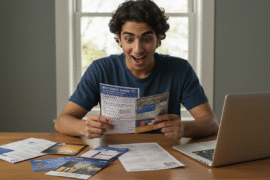This article may contain references to products or services from one or more of our advertisers or partners. We may receive compensation when you click on links to those products or services. Nonetheless, our opinions are our own.
The information presented in this article is accurate to the best of our knowledge at the time of publication. However, information is subject to change, and no guarantees are made about the continued accuracy or completeness of this content after its publication date.
Teenagers often have to deal with a lot of complicated things, and for some of them, this is when they start to feel anxious, sometimes very strongly. As parents, the first important step in helping your teen is to notice the small (and not so small) signs of anxiety. We’ll try to give you a full picture of how anxiety can show up in teens, along with useful tips for encouraging open communication, healthy coping mechanisms, and knowing when and how to get professional help. You can help your teen become more resilient and better able to handle their anxiety by giving them the right tools and creating a supportive environment.
- Understanding the Signs of Anxiety in Your Teenager
- Creating a Safe Space for Open Conversations
- Encouraging Healthy Coping Strategies and Activities
- Involving Professionals for Extra Support
- Fostering a Balanced Lifestyle Through Routine
- Teaching Mindfulness Techniques for Everyday Calm
- Identifying Different Types of Anxiety Disorders in Teens
- The Impact of School Environment on Teen Anxiety
- Exploring the Correlation Between Anxiety and Other Mental Health Issues
- Comprehensive Treatment Approaches for Teen Anxiety
- Conclusion
- Frequently Asked Questions
- What are the common signs of anxiety in teens?
- How can I encourage my teen to talk about their feelings?
- What role does routine play in reducing anxiety?
- How can physical activity impact my teen’s anxiety levels?
- Should I seek professional help for my teen’s anxiety?
- What lifestyle changes can help my teen manage anxiety?
- How can I model healthy coping mechanisms?
- Is it helpful to limit social media exposure for my anxious teen?
- Recommended Reads
Understanding the Signs of Anxiety in Your Teenager
Recognizing the signs of anxiety in your teenager can be essential in offering the support they need. Teens often feel overwhelmed, and their emotional responses may manifest in a variety of ways. Look for these common indicators that may suggest your child is struggling:
Changes in behavior: They might become withdrawn, avoiding social situations or activities they once enjoyed.
Physical symptoms: Complaints of headaches, stomachaches, or other physical ailments can be signs of underlying anxiety.
Difficulty with sleep: Insomnia, nightmares, or a reluctance to go to bed may indicate high levels of stress.
Academic declines: A sudden drop in grades or lack of focus in school can often be linked to anxiety.
Uncharacteristic irritability: Increased anger or frustration over minor issues can signal emotional distress.
Additionally, understanding the context of these behaviors is vital. For instance, if you notice a pattern of anxiety during exams or social gatherings, it might help to address those specific situations. Keep an open line of communication, encouraging your teenager to express their feelings without fear of judgment. Just knowing they have your support can make a meaningful difference.
Creating a Safe Space for Open Conversations
To foster a space where your teen feels comfortable discussing their anxieties, start by being genuinely present during conversations. Active listening is key—give them your full attention without distractions. Acknowledge their feelings without judgment; this validates their experiences. You might say, “I understand that this feels overwhelming for you,” to let them know it’s okay to express their emotions. Ensure that your home is a stress-free zone, free from distractions. Create a dedicated time each week for open dialogue, letting them choose the setting—whether it’s during a walk in the park or while cooking together.
Consider the following strategies to support open communication:
Ask open-ended questions to encourage sharing.
Share your own experiences to normalize their feelings.
Introduce gentle humor to lighten heavy moments.
Validate their emotions by reflecting on what they say.
By building this safe space, you help your teen realize that it’s okay to express their worries, ultimately making it easier for them to seek your support when they need it most.
Encouraging Healthy Coping Strategies and Activities
Adopting healthy coping strategies can make a significant difference in how your teen manages anxiety. Encouraging them to participate in activities that promote well-being is key. Physical exercise, for example, releases endorphins, which can help elevate mood. Suggest outdoor activities such as biking, hiking, or even a simple walk in the park. You might also promote creative outlets like drawing, writing, or playing a musical instrument, as these can provide a constructive way to express feelings. Additionally, you can explore mindfulness practices together, such as meditation or yoga, which have been proven to help reduce anxiety.
Consider creating a list of activities that your teen can choose from when they’re feeling overwhelmed.
Activity Table
| Activity | Benefits |
|---|---|
| Journaling | Helps process emotions and reflect on thoughts |
| Gardening | Connects with nature and promotes mindfulness |
| Cooking/Baking | Encourages focus and creativity, plus a tasty reward |
| Team Sports | Bolsters social connections and teamwork skills |
By providing options and support, you empower your child to take charge of their mental health. Remember, it’s essential to check in regularly and discuss how they feel about these activities, making adjustments as needed to ensure they feel comfortable and supported.
Involving Professionals for Extra Support
When your teen is struggling with anxiety, it can be beneficial to involve professionals who can provide specialized support. Therapists, counselors, and psychologists have the training and experience to guide your child through their challenges effectively. Engaging with these professionals can offer your child tools and strategies that you may not be equipped to provide. Consider seeking out someone who specializes in adolescent mental health, as they are more attuned to the unique pressures faced by teens today.
In your search for the right support, keep in mind the following:
Therapist compatibility: Look for a professional who is a good fit for your child’s personality and needs.
Types of therapy: Explore various therapeutic approaches, such as cognitive-behavioral therapy (CBT), which has proven effective for anxiety.
Support groups: Consider enrolling your teen in a support group where they can connect with peers facing similar experiences.
Family involvement: Some professionals encourage family therapy to foster understanding and communication within your home.
By collaborating with a professional, you are not only providing your child with valuable resources but also showing them that it’s perfectly okay to seek help. This can reinforce a positive message about mental health: that asking for support is a sign of strength, not weakness.
Fostering a Balanced Lifestyle Through Routine
Establishing a consistent routine can considerably ease the anxiety experienced by teenagers. When they know what to expect each day, it provides a sense of security that can be comforting amidst the chaos of adolescence. Consider incorporating daily rituals that promote both productivity and relaxation. Set aside time for study, physical activity, and creative pursuits, while also prioritizing moments for casual conversation. A balanced daily structure can empower your child to manage their time effectively, reducing feelings of overwhelm.
Here are a few suggestions to help create that balanced routine:
Morning routine: Encourage them to wake up at the same time each day and engage in a healthy breakfast.
Scheduled breaks: Incorporate short breaks during study sessions to prevent burnout.
Family time: Dedicate evenings to family activities, fostering connection and support.
Mindfulness practices: Introduce activities like meditation or journaling to promote emotional awareness.
Voted "Best Overall Budgeting App" by Forbes and WSJ
Monarch Money helps you budget, track spending, set goals, and plan your financial future—all in one app.
Get 50% OFF your first year with code MONARCHVIP
Teaching Mindfulness Techniques for Everyday Calm
Teaching your teen mindfulness techniques can be a powerful tool for managing anxiety and fostering a sense of calm in their daily lives. Start with simple practices that can be integrated into their routine, such as:
Deep breathing: Encourage them to take a few minutes each day to focus on their breath. Inhale deeply for a count of four, hold for four, and exhale for four.
Grounding exercises: Use techniques like the 5-4-3-2-1 method to help them connect to the present.
Body scan: Guide them through a body scan meditation, where they focus on relaxing each part of their body.
Daily journaling: Encourage your child to write down their thoughts and feelings.
Mindful walking: Suggest they take short walks, paying attention to their surroundings and sensations.
Creating a peaceful environment at home can also support mindfulness practices.
Mindfulness Activity Table
| Activity | Description |
|---|---|
| Yoga sessions | Use guided videos for relaxing stretch routines together |
| Nature time | Spend time outdoors to appreciate the sights and sounds |
| Tea time | Prepare and enjoy a cup of herbal tea, focusing on the moment |
| Creative arts | Engage in drawing or painting as a non-judgmental expression |
Identifying Different Types of Anxiety Disorders in Teens
Parents must be aware of the various types of anxiety disorders that can affect teens. Generalized Anxiety Disorder (GAD) is characterized by excessive worrying about multiple aspects of life, while Social Anxiety Disorder involves intense fear of social situations. Panic Disorder manifests as sudden and repeated attacks of fear, while Obsessive-Compulsive Disorder (OCD) leads to uncontrollable thoughts and behaviors. Understanding these distinctions can help parents provide the necessary support and seek professional help if needed.
Anxiety in teens can manifest in various forms, impacting their daily lives and overall well-being. By encouraging mindfulness practices such as mindful walking and creating a peaceful home environment, parents can support their teens in processing emotions more effectively. Engaging in activities like yoga sessions, spending time in nature, enjoying tea moments, and exploring creative arts can promote relaxation and self-expression. Parents need to understand the different types of anxiety disorders that teens may experience.
Separation Anxiety
Separation anxiety is another common form of anxiety that teens may experience, characterized by excessive fear or worry when separated from individuals they are emotionally attached to, typically parents or caregivers. Parents can help by gradually exposing their teens to short periods of separation, building trust and independence over time. Establishing a consistent routine and providing reassurance can also aid in managing separation anxiety effectively. By fostering a supportive and understanding environment, parents can help their teens navigate through this challenging phase with resilience and confidence.
Phobias and Specific Fears
In addition to general anxiety, teens may also develop specific phobias or fears that can significantly impact their daily functioning. Parents must recognize these fears and work with their teens to address them in a supportive manner. By slowly exposing them to their triggers in a controlled environment and encouraging open communication, parents can help their teens gradually overcome these challenges. Seeking guidance from a mental health professional can provide additional strategies and support tailored to their specific fears.
The Impact of School Environment on Teen Anxiety
School environments can play a significant role in exacerbating or alleviating teen anxiety. Academic pressure, social dynamics, and performance expectations can contribute to heightened stress levels among teens. Educators and parents must create a supportive and understanding atmosphere where teens feel comfortable expressing their concerns and seeking help when needed. Encouraging open dialogue about mental health, providing access to resources such as counseling services, and promoting a healthy work-life balance can all help reduce anxiety levels in teens.
School Refusal and Its Effects
School refusal, often linked to underlying anxiety issues, can have detrimental effects on a teen’s academic performance and overall well-being. It is essential for parents and educators to address school refusal promptly and compassionately. By identifying the root causes of this behavior and providing appropriate support, such as therapy or accommodations, teens can gradually reintegrate into the school environment with confidence and reduced anxiety levels. Creating a supportive network involving school staff, mental health professionals, and family members can greatly aid in managing school refusal effectively.
Exploring the Correlation Between Anxiety and Other Mental Health Issues
Exploring the correlation between anxiety and other mental health issues is important in understanding and addressing the complexities of teen mental health. Anxiety disorders often coexist with conditions such as depression, ADHD, or eating disorders, presenting unique challenges for diagnosis and treatment. Integrated approaches that consider comorbidities and individual needs are vital in providing comprehensive care for teens struggling with multiple mental health issues. By fostering collaboration between professionals, clinicians can develop personalized treatment plans that target underlying causes and promote overall well-being in adolescents.
Anxiety and Depression
The intricate relationship between anxiety and depression in teens is a significant aspect of mental health that requires careful attention. Both conditions often co-occur, amplifying the challenges faced by adolescents. Understanding the interplay between anxiety and depression is essential in developing effective interventions and support systems for teens experiencing these complex emotions. By addressing both anxiety and depression concurrently through therapy, medication, and holistic approaches, it becomes possible to help teens navigate their emotions and build resilience for better mental well-being.
Anxiety and Substance Use
Exploring the link between anxiety and substance use is essential in recognizing how one can influence the other in teens. Adolescents with anxiety disorders may turn to substances as a coping mechanism, leading to potential addiction issues and worsening mental health outcomes. By addressing underlying anxiety issues through therapy and support, it becomes possible to reduce the risk of substance misuse and provide healthier coping strategies for teens. Collaborative efforts between mental health professionals and addiction specialists are essential in developing comprehensive treatment plans that address both anxiety and substance use effectively, promoting long-term recovery and well-being in adolescents.
Comprehensive Treatment Approaches for Teen Anxiety
Comprehensive treatment approaches for teen anxiety involve a multifaceted strategy that addresses the underlying causes of anxiety while promoting overall well-being in adolescents. Integrating therapy, medication (when necessary), lifestyle modifications, and support systems plays an important role in managing teen anxiety effectively. By fostering a supportive environment at home and school, encouraging healthy coping mechanisms, and providing access to mental health resources, teens can learn to navigate their anxiety more effectively and build resilience for long-term mental well-being.
Cognitive Behavior Therapy with Exposure and Response Prevention
Cognitive Behavior Therapy (CBT) with Exposure and Response Prevention (ERP) is a highly effective therapeutic approach for treating anxiety disorders in teens. By identifying negative thought patterns and behaviors that contribute to anxiety, CBT helps adolescents develop healthier coping mechanisms and adaptive responses to stressors. The incorporation of ERP allows teens to confront their fears in a controlled environment, gradually reducing anxiety triggers and building resilience over time. This structured approach empowers teens to manage their anxiety more effectively and achieve lasting improvement.
Acceptance and Commitment Therapy
Acceptance and Commitment Therapy (ACT) is another valuable approach in treating teen anxiety. By promoting psychological flexibility and mindfulness, ACT helps adolescents to accept their thoughts and emotions without judgment while committing to actions aligned with their values. This therapeutic technique empowers teens to build resilience in the face of anxiety by fostering a greater sense of self-awareness and emotional regulation.
Interpersonal Therapy
Interpersonal Therapy (IPT) is a beneficial therapeutic modality that focuses on improving communication and relationship skills in teens struggling with anxiety. By addressing interpersonal issues and enhancing social connections, IPT helps adolescents build a support network that can aid in managing stress and anxiety effectively. Through this approach, teens learn to express their emotions, set boundaries, and develop healthier relationships, leading to improved mental well-being and reduced feelings of isolation.
Conclusion
To help teens with anxiety, you need to be patient, understanding, and proactive all the time. You can help your teen deal with their emotional problems by recognizing the signs, encouraging open communication, teaching them healthy ways to cope, and knowing when to get professionals involved. Always remember that your support and commitment to their health are very important. You can help your teen become more resilient, deal with anxiety better, and do well during this important stage of development by using a balanced approach that includes understanding, practical strategies, and professional help when needed.
Frequently Asked Questions
What are the common signs of anxiety in teens?
Teens often experience a range of emotions, but signs of anxiety can be more pronounced. Look for symptoms such as excessive worrying, irritability, changes in behavior, withdrawal from social activities, difficulty concentrating, sleep disturbances, or physical complaints like headaches and stomachaches. Recognizing these signs early can lead to timely intervention.
How can I encourage my teen to talk about their feelings?
Creating a safe and supportive environment is key. Choose a comfortable setting, and let your teen know that it’s okay to express their feelings without fear of judgment. Be patient and listen actively; sometimes they just need a gentle nudge to share their thoughts. Regular check-ins can help normalize discussions about emotions.
What role does routine play in reducing anxiety?
Establishing a consistent daily routine can provide a sense of stability and predictability, which can be comforting for anxious teens. Encourage habits like regular sleep patterns, mealtimes, and time for homework or relaxation. This structure can help them manage their time better and reduce feelings of being overwhelmed.
How can physical activity impact my teen’s anxiety levels?
Physical activity is a powerful tool for reducing anxiety. Exercise releases endorphins, which are natural mood lifters. Encourage your teen to engage in regular physical activities that they enjoy, whether that’s sports, dance, or simply walking. This not only helps with anxiety but also boosts their overall mental well-being.
Should I seek professional help for my teen’s anxiety?
If your teen’s anxiety interferes with their daily life or well-being, seeking professional help is a good step. A mental health professional can offer tailored strategies and therapies that can help your teen manage anxiety effectively. It’s critically important to approach this gently, emphasizing that seeking help is a sign of strength.
What lifestyle changes can help my teen manage anxiety?
Encouraging healthy lifestyle habits is important. Promote a balanced diet, adequate sleep, and time for relaxation or hobbies. Introducing mindfulness practices such as meditation or yoga can also be beneficial. These changes can help instill a sense of control and reduce anxiety levels over time.
How can I model healthy coping mechanisms?
Children often learn by observing their parents. Demonstrating healthy coping mechanisms, such as talking about your feelings, using positive self-talk, or managing stress through activities you enjoy, can provide your teen with strategies to emulate. Share your experiences and show that it’s okay to seek help when needed.
Yes, regulating social media use can be beneficial. Social media can sometimes exacerbate anxiety through comparison or exposure to negative content. Encourage your teen to take breaks from social media and engage in face-to-face interactions. Discussing their online experiences can also help them process any negative emotions that arise.

Reviewed and edited by Albert Fang.
See a typo or want to suggest an edit/revision to the content? Use the contact us form to provide feedback.
At FangWallet, we value editorial integrity and open collaboration in curating quality content for readers to enjoy. Much appreciated for the assist.
Did you like our article and find it insightful? We encourage sharing the article link with family and friends to benefit as well - better yet, sharing on social media. Thank you for the support! 🍉
Article Title: Anxiety in Teens: How to Help Your Child Cope
https://fangwallet.com/2025/06/10/anxiety-in-teens/The FangWallet Promise
FangWallet is an editorially independent resource - founded on breaking down challenging financial concepts for anyone to understand since 2014. While we adhere to editorial integrity, note that this post may contain references to products from our partners.
The FangWallet promise is always to have your best interest in mind and be transparent and honest about the financial picture.
Become an Insider

Subscribe to get a free daily budget planner printable to help get your money on track!
Make passive money the right way. No spam.
Editorial Disclaimer: The editorial content on this page is not provided by any of the companies mentioned. The opinions expressed here are the author's alone.
The content of this website is for informational purposes only and does not represent investment advice, or an offer or solicitation to buy or sell any security, investment, or product. Investors are encouraged to do their own due diligence, and, if necessary, consult professional advising before making any investment decisions. Investing involves a high degree of risk, and financial losses may occur including the potential loss of principal.
Source Citation References:
+ Inspo
There are no additional citations or references to note for this article at this time.












































